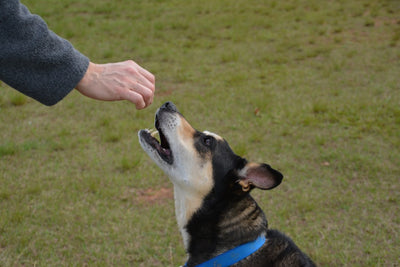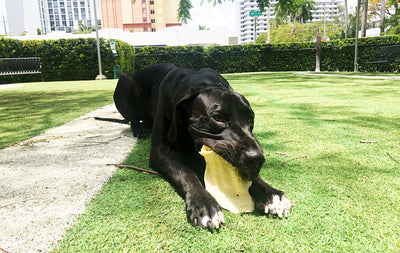Knowing what dog treats are suitable for your puppy is important for their safety and nutrition, Big Lu has got your back with some helpful suggestions.
So we’ve all been there, you’re cuddling with your furry friend and then it hits you… they got some stinky breath! Now, we’re not just talking about any kind of stinky breath…
We’re talking about… FISH BREATH.
Yeah, we hear ya, it's not fun for the hooman, or for the dog. Initially, your first thought might be “what in the world has my dog been eating?”, and unless they’ve been doing some funky business and digging through the trash, then you figure it's just time for a good ol’ teeth cleaning.
While that is one solution, it might not always be the fix seeing as there can be multiple reasons for this “fishy-odor” breath. Big Lu is here to run you down a few possible reasons why your dog's breath smells like fish, and more importantly how to go about fixing it.
Let's get started with a list of the most common reasons why your dog might have “fish breath” and solutions:
1. Poor Dental Hygiene
The first reason your dog probably has this stinky fish breath is that you are probably not taking the necessary precautions to properly keep your dogs mouth clean. It's important to remember that dogs need careful attention to their oral hygiene to avoid any future complications; not just dental problems such as tooth abscess’ that could require root canals, but also other long term medical complications. Much like humans, the accumulation of plaque that can turn into tartar can cause bad breath and inflammation in the gums.
- Solution: Make sure to use a dog-friendly soft bristle toothbrush and toothpaste to clean your furry friend’s teeth 2-3 times a week. Never use human toothpaste as it can be harmful to them if they swallow. Although your vet will do this for the most part, as a dog owner, it is important to take a look at your dog’s teeth and gums every time you brush so you can keep track of any noticeable changes. We know that keeping your dog still while brushing can be challenging, so we suggest getting your furry friend natural dog treats that will aid their dental health by removing plaque/tartar (typically long-lasting, harder chews) as they chew and, or alternatively, a treat that helps massage the gums (softer chews such as cow tails).
2. Your Dog is Eating Fish or Taking Fish Oil Supplements
Now this one might seem a bit obvious, but we gotta talk about the probable case scenarios here. If for some reason you’re feeding your furry friend any kind of dog food, supplement, or treat that is fish-based, then that is likely the main reason for their “fish breath”. Just like humans, dogs can also burp and this will cause any smell of what they have most recently consumed to surface. While this is a possible reason for your doggos bad breath, we would not suggest to simply discard any of the other possibilities listed that could be reflecting on their breath.
- Solution: First, we would suggest visiting a professional to completely discard the possibility of any underlying health conditions, such as halitosis, gastrointestinal abnormalities, etc. Once you discard any harmful complications, if the odor of the fish-based product is bothersome, try going for odorless supplements or fish alternative foods to your pup. Natural dog treats based on beef, chicken, turkey, etc. are great and healthy alternatives.
3. Age and Oral Health
If you don’t take care of your doggos brushing on a regular basis, then you might end up seeing cavities, gingivitis, periodontitis, and even tooth loss in the long run. As far as “fish breath” goes, Halitosis is the diagnosis for dogs with bad breath; and as discussed previously, it can be caused by the build of plaque which is typically followed by the inflammation of gums.
However, mouth tumors can be among the more concerning possibilities for your dog’s bad breath. While cancerous tumors are a possibility, especially with older dogs, not all oral tumors are harmful. So while it is important not to freak out at the first sight of a lump, being observant of the following signs, apart from Halitosis (bad breath), is also important as they can be symptoms of oral tumors: drooling, swelling of the face, pawing at the mouth, repeated opening and closing motions of the mouth, and problems eating and/or drinking.
- solution: The main thing you can do in your home is to take preventative measures and clean your dog’s mouth on a routine basis. Inspecting your doggos teeth/oral cavity, especially for your adult doggos that are prone to more serious complications, and keeping note of any mentioned symptoms or worsening conditions in the oral cavity is crucial. Big Lu also highly recommends making sure to ask your vet to perform a dental exam on your dog every 6 to 12 months as part of the routine checkups, which are of course essential for your dog’s health.
Underlying Health Conditions
While we’ve gone over the main issues in the oral cavity that could be causing your doggos “fish breath”, there are some other health conditions that you should be aware of. These include conditions such as metabolic issues (e.i. Kidney disease usually in older dogs), gastrointestinal issues (e.i. gastrointestinal disease), respiratory infections, or even anal gland secretions (may cause your doggo to scratch/bite that area).
- Suggestions: Though some of these issues may be curable, you don’t want to discard the possibilities. It is important to be aware of any foul odored secretions or visible discomforts in your dog's body. For instance, if you see your dog “scooting”, which means sliding his behind on the floor, that is a clear indication that they may need to visit the vet to take care of any anal gland inflammation they might have. You want to be as cautious as possible to avoid any infections when it comes to your doggos health.
Overall, there are many reasons why our dogs may have stinky fish breath, but perhaps the most important thing is to stay informed and to routinely check in with your dog’s veterinarian. Though a stinky fish breath might go away with simply brushing and a proper dental routine, it is always best to address any doubts or concerns with the health professional.
Happy Brushing!






